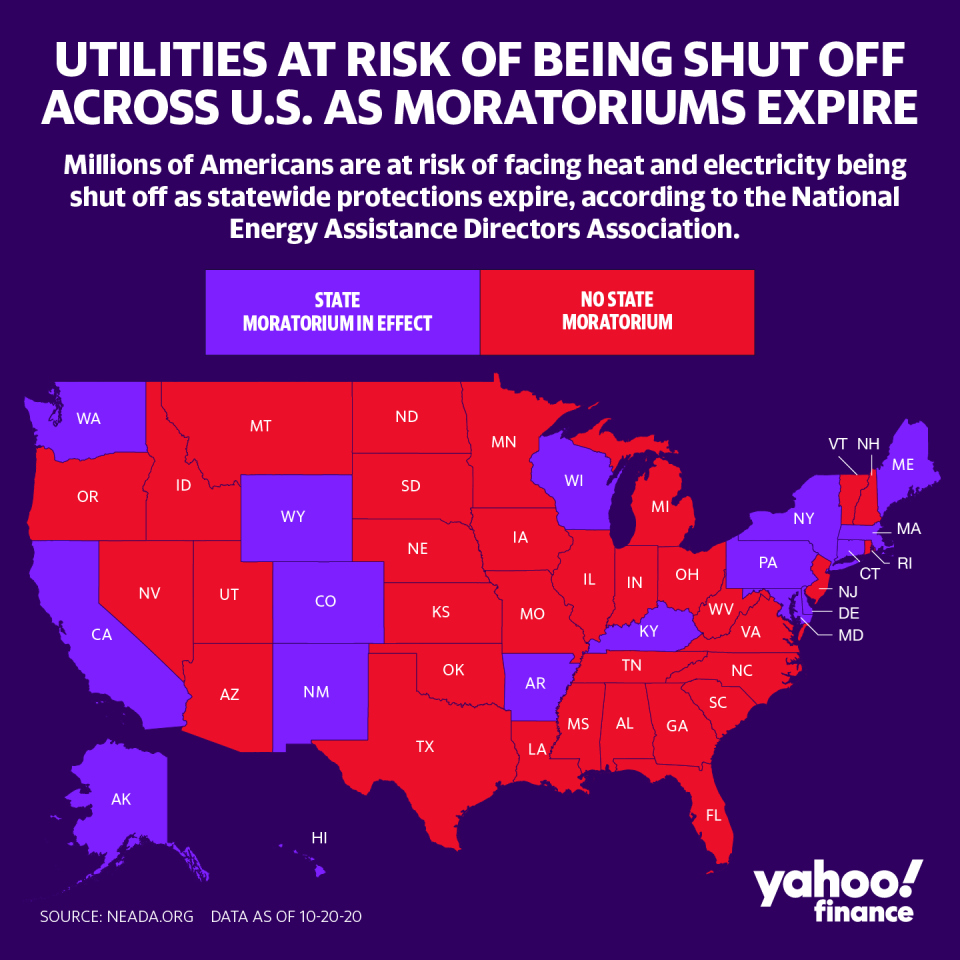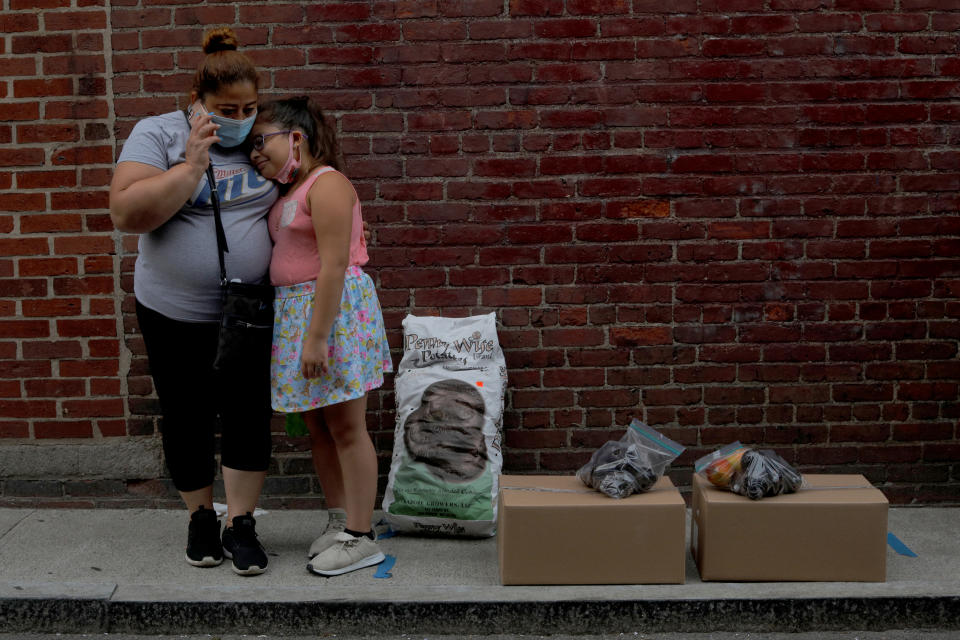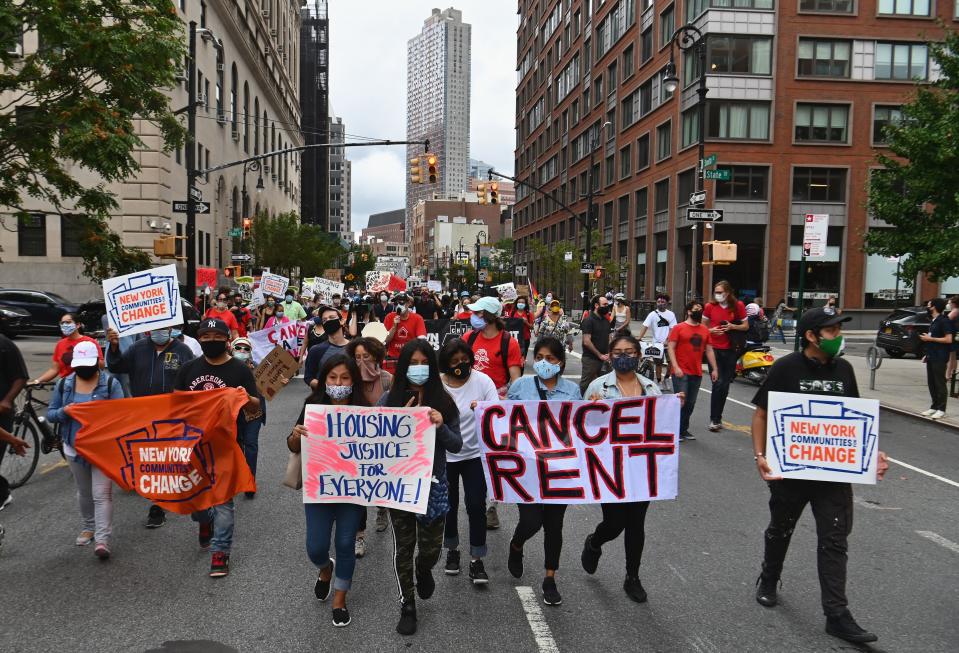Coronavirus: Millions are at risk of utilities being shut off as protections expire
Keeping the lights on will get harder for millions of struggling Americans.
State-level protections against electricity, water, and gas disconnections are quickly expiring across the U.S. just as colder weather looms, unemployment remains high, and the prospect for additional government aid remains uncertain.
By mid-November, utility shutoff moratoriums in seven states will expire, while protections in six states will lapse by the end of the year, according to the National Energy Assistance Directors Association. Already, protections have expired or don’t exist in 33 states.
By the end of the month, 82 million households won’t have shutoff protections, including 11 million households that were living below the poverty line before the pandemic began and 10 million people who are unemployed, according to a study by Carbon Switch, an energy-efficiency startup.

“This is a public health crisis,” said Mark Wolfe, executive director at the National Energy Assistance Directors Association. “Shutting this many people out will have a domino effect on how your children will access their Zoom call, how you’ll have access to electricity to function or run a refrigerator, and your ability to maintain a normal life.”
‘Leaving customers in danger of connection during the pandemic’
The average U.S. household pays $167 a month in utilities, according to statistics from the government’s Energy Star Program. In states such as Kansas and Idaho where the minimum wage is $7.25 per hour, residents would devote almost 15% of their monthly paychecks to utilities assuming they are able to work 40 hours a week.
But many people aren’t able to work that much. Nearly a quarter of Americans reported that even though they haven’t lost their jobs, their hours have been cut or their pay reduced due to the economic fallout from the pandemic, according to a Pew Research Study.

While the CARES Act passed in March provided $900 million to supplement the Low Income Home Energy Assistance Program — which helps lower-earning households pay home heating and cooling bills — many local and state offices have closed their doors on new applicants, according to Karen Lusson, staff attorney at the National Consumer Law Center, a nonprofit focused on low-income populations.
Getting help from providers can be elusive, too. In states such as Colorado and Florida, protections from utility shut-offs vary by provider. While the bulk of them may offer payment plans, they won’t excuse rent-burdened Americans from late fees and the amount owed.
Read more: Here's why utility disconnections are becoming a bigger problem: 'Money, Honestly' podcast
“The states where public service commissions are not requiring utility providers to create flexible payment arrangements and debt forgiveness are leaving customers in danger of connection during the pandemic,” Lusson said.
Another complication: Many Americans mistake utility companies for being government owned when in fact they are private companies.

“People believe that utilities are run by government agencies and therefore they’re excused,” said Carlos Martin, a senior fellow in the Metropolitan Housing and Communities Policy Center at the Urban Institute. “A shutoff moratorium means your private utility company can’t take your power off, but when this moratorium ends, it doesn’t mean you're off the hook for all the energy you used.”
Government needs to step in
While utility providers can apply for loans under the federal government’s Payment Protection Program, lessening their burden if customers aren’t paying, there’s less help for individuals.
“Statewide public utility commissions need to assist customers who are desperate for financial need and unable to afford their utility bills,” Lusson said. “The actions these commissions can take are debt forgiveness programs, offer flexible credit and collection procedures, and ensure previously disconnected consumers are connected with no fees.”
But some state regulators have instead sided with utility companies. In Florida, state regulators turned down a proposal by the League of United Latin American Citizens of Florida and two utility customers for a 90-day moratorium on disconnections. The regulators agreed that utility companies’ were already supporting consumers by providing payment plans.
Federal relief is also needed, especially for arrearages, Lusson said.
The revised HEROES Act passed by the House included $4.5 billion for the Low Income Home Energy Assistance Program, but talks on the next stimulus package remain stalled even as the pandemic wears on, hurting many Americans, especially low-income families.
“You have millions of families impoverished who don’t have resources,” Wolfe said. “Congress has to step in and pay these bills, otherwise these utility companies will write off these arrearages and raise rates for residents.”
Dhara is a reporter Yahoo Money and Cashay. Follow her on Twitter at @Dsinghx.
Read more:
Housing expert: Eviction moratorium are ‘not enough’ during pandemic
‘Gone in 90 minutes:’ Rental Assistance is quickly running out for struggling renters
‘Not a rent holiday’: Trump’s new eviction order leaves renters on hook for back pay
Read the latest financial and business news from Yahoo Finance and Yahoo Money
Follow Yahoo Finance on Twitter, Facebook, Instagram, Flipboard, SmartNews, LinkedIn, YouTube, and reddit.

 money
money 